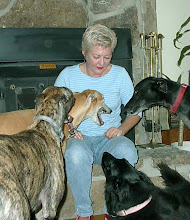Thursday, June 25, 2009
Internet Road Kill: Dead Blogs
I've finally come up with a system -- and no, it's not some cheesy MLM auto-friender or something like that. It's simply the easiest way I've found to interconnect all my "stuff" -- Twitter, Facebook, MySpace, LinkedIn, and listserves -- to reach the most people with the least effort. Took me a while to puzzle out all the interconnections and third party add ons, but I think I've got it now!
There's an ebook on it on http://bamwriters.com.
(And if I'd followed my own advice last week, my blogs wouldn't be out of date! Catching up tomorrow!)
Monday, June 8, 2009
Smashwords
Solution: http://smashwords.com Smashwords will translate your WORD document into multiple ebook formats and pays high royalties, non-exclusive sales agreement. Check it out. Brilliant stuff.
Sunday, June 7, 2009
Smells and bells and the first person.
How do you know if you're doing this?
Look for passages where you attribute sensory experiences, e.g. I smelled, I heard, I saw. Lose the attributions and place your reader directly inside your character's head.
Wrong: I smelled gunpowder.
Right: The room stank of gunpowder.
Wrong: I heard the bells ringing.
Right: The bells rang.
Same thing with feelings. If you have sentences that start, "I felt...," rewrite them to place the reader directly in the character's head.
Wrong: I felt worried.
Right: It wasn't going to be all right. It would never be all right.
See? Stay in the character's head, not outside it.
Saturday, June 6, 2009
POV and Distance from Character
Everybody knows what POV is, right? Point of View. Or, if you're in the military, Privately Owned Vehicle. (This will explain a lot of my confusion early on.)
POV is fairly easily mastered. You stay in one head in one scene, right? No telling the story from a female protagonist's point of view and then having her boyfriend do a "he thought" attribution in the same scene. That's not rocket science.
The more subtle issue is distance from the character. Let me give you a few examples:
Jason was wondering what the funny green bird was called.
I wonder what that funny green bird is called, Jason thought.
I wonder what that funny green bird is?
What's that funny green bird?
Do you see how these progress from rather distant to close in?
Once you get close, you can't pull back. That's the general rule.
The reason is that you'll jar the reader. After all, you've gone to a lot of trouble to get your reader to identify with your characters and suspend disbelief and buy the entire world you're creating. You've got them inside this character's head, along for the ride, then BOOM! You pull back from the character. That jars the reader out of the story and undoes everything you've tried to achieve.
So don't do it.
Thursday, June 4, 2009
Want a few tips on writing?
- It's worth more than lunch
- It takes longer than lunch.
- Ruins the meal to talk about bad writing and teach at the same time.
- Until you've put in the time in front of the keyboard, it won't help.
It's like law. Just because it's in English, don't assume you understand it.
Lowering the barriers or letting in the idiots?
I ran across a new crop of idiots the other day on ehow.com. There was one guy in particular whose only publishing credit was through Publish
But the downside is that the signal to noise ratio has dropped dramatically. One can no longer rely on the fact that a book is actually IN PRINT in assuming at least a modicum of worth. Getting printed has become synonymous with getting published, and folks – that's just not the case.




